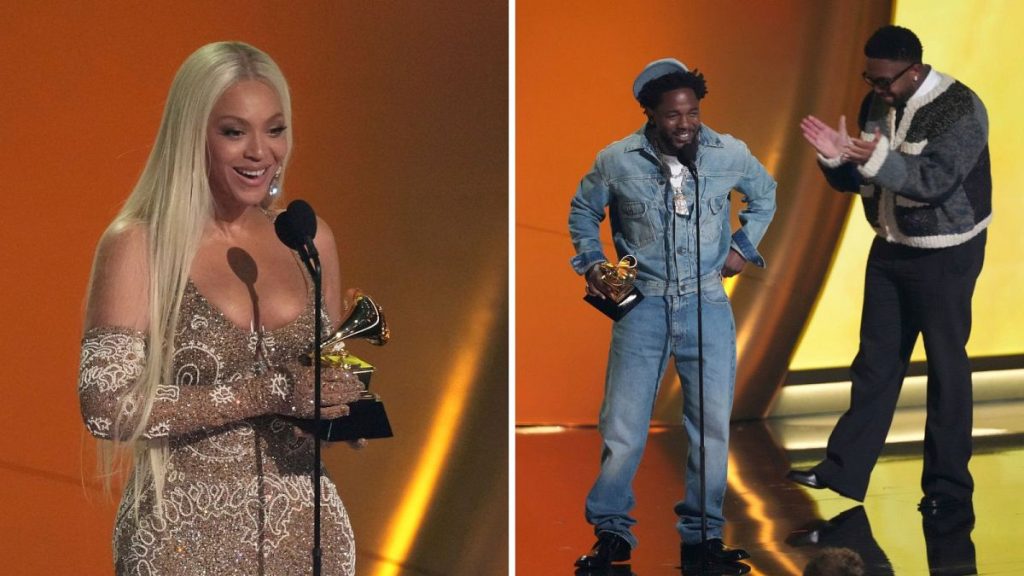The 67th Grammy Awards, held in Los Angeles amidst the backdrop of devastating wildfires, witnessed a historic night for Beyoncé and Kendrick Lamar. Beyoncé’s “Cowboy Carter” secured the coveted Album of the Year award, a first for the artist after four previous nominations in the category. This win solidified Beyoncé’s position as the most awarded artist in Grammy history with 35 wins and marked a significant milestone as the first Black woman to win Album of the Year in the 21st century. Beyoncé’s win, presented by Diana Ross, also resonated within the country music genre, as “Cowboy Carter” garnered the Best Country Album award, despite being previously overlooked by the Country Music Awards. This victory underscored Beyoncé’s perspective on genre as a potentially limiting construct and encouraged artistic exploration beyond conventional boundaries.
Kendrick Lamar dominated the rap categories, sweeping all five nominations, including the prestigious Record of the Year and Song of the Year for his impactful diss track, “Not Like Us.” This marked a significant victory for hip-hop, with “Not Like Us” becoming only the second hip-hop track to win Record of the Year, following Childish Gambino’s “This Is America.” Lamar’s wins further cemented his status as a leading voice in rap and effectively concluded his highly publicized rap battle with Drake. The resounding critical and popular acclaim for “Not Like Us” stood in stark contrast to Drake’s ongoing lawsuit against Universal Music Group for defamation related to the track, highlighting the song’s cultural relevance and impact.
Emerging artists also shone brightly at the ceremony. Chappell Roan, claiming the Best New Artist award, delivered a powerful acceptance speech advocating for fair wages and healthcare for developing artists within the music industry. She challenged record labels to prioritize the well-being of their artists, particularly those starting their careers, echoing the struggles many young musicians face in the industry. Sabrina Carpenter celebrated a double win, securing both Best Pop Vocal Album for “Short n’ Sweet” and Best Pop Solo Performance for her viral hit “Espresso.” These wins affirmed Carpenter’s rising star status and her ability to connect with audiences through her music.
Doechii’s victory for Best Rap Album with “Alligator Bites Never Heal” resonated as a powerful moment of representation for Black women in music. Her acceptance speech served as an inspiring message of encouragement and empowerment, defying stereotypes and affirming the potential for success regardless of background. Other notable wins included Charli XCX’s Best Dance/Electronic Album for “Brat,” and a poignant win for The Beatles’ “Now and Then” for Best Rock Performance. This “final” Beatles song, featuring AI-restored vocals from John Lennon, marked a unique moment in music history. Sean Lennon, accepting the award, emphasized the timeless appeal of The Beatles and encouraged the continued sharing of their music across generations.
The Weeknd’s presence at the ceremony, performing for the first time since initiating a boycott in 2020, signaled a shift in his relationship with the Recording Academy. His return reflected the Academy’s efforts to address diversity concerns within its voting body, a point of contention previously voiced by The Weeknd. This reconciliation underscored the importance of dialogue and change within the music industry.
The Grammys also acknowledged the devastating impact of the Los Angeles wildfires, incorporating a tribute montage and raising $7 million in pledges for relief efforts. Host Trevor Noah’s opening remarks emphasized the resilience of the city and the power of music to unite and heal. Performances by Dawes, John Legend, Brad Paisley, Sheryl Crow, Brittany Howard, St. Vincent, Lady Gaga, Bruno Mars, and Billie Eilish all paid homage to Los Angeles and its vibrant music scene.
Several artists used the platform to advocate for social and political causes. Shakira, winning Best Latin Pop Album for “Las Mujeres Ya No Lloran,” dedicated her award to immigrant communities in the US. Lady Gaga, accepting the Best Pop Duo/Group Performance award alongside Bruno Mars, voiced her support for the LGBTQIA+ community, highlighting the importance of visibility and acceptance. Alicia Keys, receiving the Dr. Dre Global Impact Award, championed diversity and inclusion within the music industry, emphasizing the richness and power of diverse voices. These moments reflected the growing use of the Grammys as a platform for social commentary and activism.
The 67th Grammy Awards showcased a blend of historic wins, emerging talent, social activism, and community resilience. Beyoncé’s groundbreaking achievement, Kendrick Lamar’s dominant performance, and the powerful messages delivered by various artists underscored the evolving landscape of the music industry and its role in reflecting broader social and cultural conversations. The ceremony’s recognition of the Los Angeles wildfires and the dedication of resources to relief efforts highlighted the interconnectedness of the music community and its commitment to supporting those affected by tragedy.














